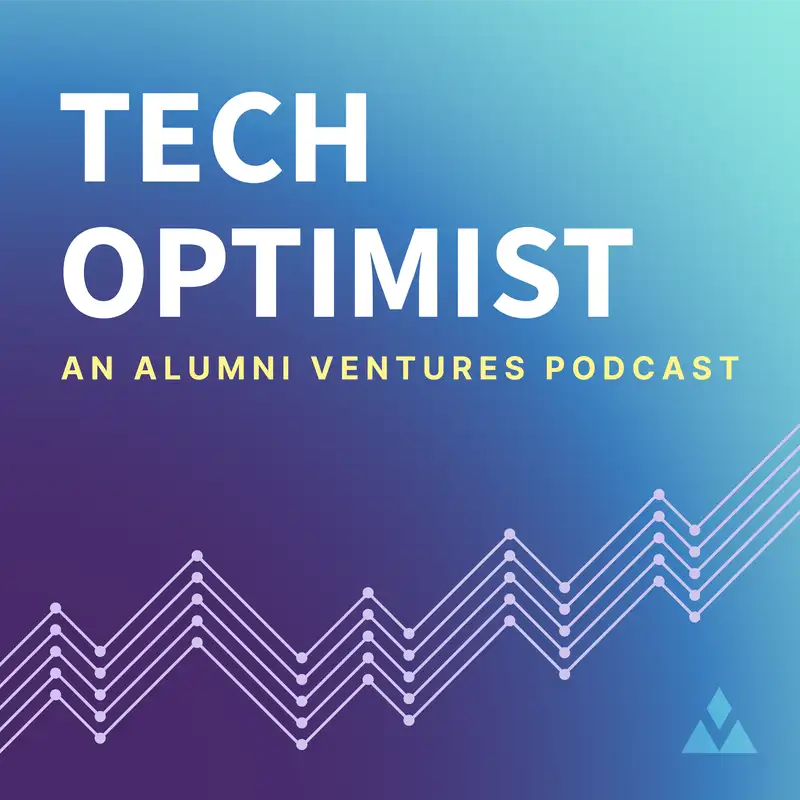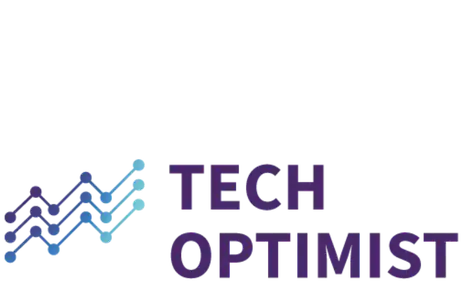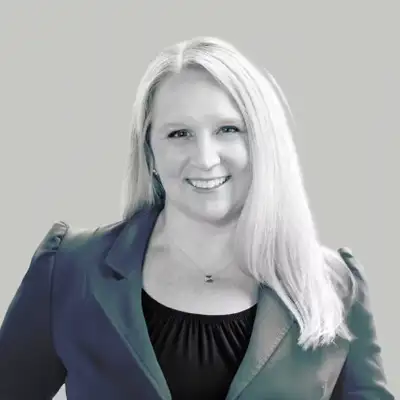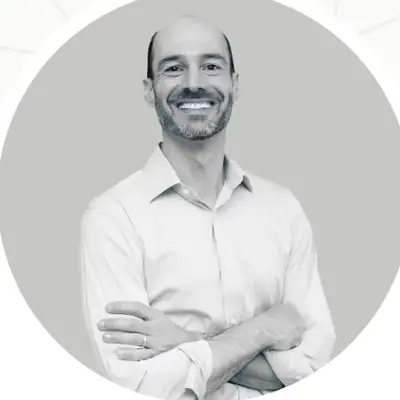#37 - Three Breakthroughs: Search 2.0., Advances in Exo-Suits, and These New Blood Tests Change Everything
Sam Herrick:
So you're telling me Google is outdated, someone made an Iron Man suit, and blood tests can tell me even more than ever before?
Mike Collins:
Being really good at that tool has proven to be really a professional attribute.
Matt Caspari:
So depending on your posture and what you're doing, this exoskeleton provides real-time support.
Mike Collins:
Hand in glove, I think that that's really exciting that we're finally starting to see it on one of the most terrible diseases that our society has to deal with.
Sam Herrick:
All right, everyone. You know the drill. Welcome back to this episode of the Tech Optimist: Three Breakthroughs. Now, the voices you'll hear today are from Mike Collins, as always, founder and CEO at Alumni Ventures. And his partner today is Matt Caspari, a managing partner also here at Alumni Ventures. And of course, as always, you'll hear me, your tech note writer, your guide, your narrative savant, Sam Herrick. Let's get into it.
In a world captivated by criticism, it's easy to overlook the groundbreaking technologies shaping our future. Let's shine a light on innovators who are propelling us forward.
As the most active venture capital firm in the US, we have an exceptional view of tech's real-world impact. Join us as we explore, celebrate, and contribute to the stories of those creating tomorrow.Welcome to the Tech Optimist.
As a reminder, the Tech Optimist Podcast is for the informational purposes only. It is not personalized advice and it is not an offer to buy or sell securities. For additional important details, please see the text description accompanying this episode.
Mike Collins:
I'm good. It looks like you got a little sun.
Matt Caspari:
I have been getting some sun. It's nice.
Mike Collins:
Good.
Matt Caspari:
We were in the south of France for a few days so I got a lot of sun in a short period of time.
Mike Collins:
All right. Ready to hop in? I'll let you get back to better things.
Matt Caspari:
Yeah, I'm ready.
Mike Collins:
Okay, so welcome to the Tech Optimist Podcast, our three breakthroughs segment, where we talk about things that we're really excited about in the world of science and technology. I'm here with my partner Matt Caspari. I'm Mike Collins, the founder and CEO of Alumni Ventures.
And I think I'm kicking it off this week, and my breakthrough the week is I'm calling the end of search.
Matt Caspari:
Okay.
Mike Collins:
So I think one of the fantastic things that Google, Alphabet, has done is they've just made it such a part of white collar work that actually being really good at Google is a differentiator in a lot of white collar jobs. I think it's how people do research. I think how they get a lot of things done during the day. It's, "I'm going to Google it." And being really good at that tool has proven to be really a professional attribute.
Sam Herrick:
What we slowly found is the purpose of these tech notes is for my curiosity to flourish and really develop into what it is. So a thought popping into my head, I was like, "Huh, I wonder if there are any crazy Google stats out there?" Like how many people use it a day, how many searches there are? And of course there are stats out there. Some of these are directly from Google themselves, some are from some people that worked at Google on Reddit, and then also some from a website called Semrush, which also has a lot of Google search statistics on there.
So Google processes approximately 8.5 billion searches per day. This breaks down to about 5.9 million searches every minute. The total number of Google searches per year is estimated at 3.1 trillion and 63% of these searches in the US occur on mobile devices, meaning they're coming from cell phones instead of from desktop computers.
In terms of search query length, the most common Google searches contains three to four words, specifically 38.2% of US Google searches on desktop and 39.9% on mobile fall into this category.
So Google Search Index, which is used to provide results for all of these daily searches, is over 100 million gigabytes in size. So let's think about that for a second. So the iPhone, the most common storage size for an iPhone, like the phone that's either on your desk or on your dashboard while you're listening to this or in your pocket, has about 64 gigs of storage on it. You also can upgrade to get 128 or 256 if you really feel like it. 100 million gigabytes. Let's try and sort of quantify how large that is.
So let's take a blockbuster movie, for example, like Dune that just came out recently or Oppenheimer that came out just about a year ago, a fantastic very high quality borderline 6K footage that landed just about three hours with IMAX screens. From what I've been seeing, since it's an actual film, when it was digitized, the 4K digital version of Oppenheimer is likely around 400 to 430 gigabytes in size. So meaning, if Google was just a storage device, it could hold 250,000 copies of the digital Oppenheimer movie. That's big. That is pretty insane. And yeah, all right, there's my little tangent. Let's get back into the interview.
Mike Collins:
And it's obviously evolved a lot. I mean, I go back to when there was multiple search engines and Google-
Matt Caspari:
I remember those days, yeah.
Mike Collins:
Alta Vista.
Matt Caspari:
Alta Vista, yeah, yeah.
Mike Collins:
All this stuff. And they've turned it into basically a trillion dollars of value. And really clever. It's evolved. I think it's gotten worse personally that with a lot of kind of sponsor stuff at the top.
Matt Caspari:
Yeah, rising at the top, yeah.
Mike Collins:
But I'm going to tell you, I think we're at an inflection point where your search is going to become AI driven and answer driven. And so I'm just going to tell you a story from literally this morning, Matt, which is, again, been married 35 years. That's an approximation. It's a long time. And we discuss yogurt, disproportionate to normal people. And so it's like, "What do you look for? What are your kind, my kind? Oh, that has too much sugar in it. Oh, I'm looking for more protein," blah, blah, blah. Just boring, old married couple stuff. And there was an article, I think it was in The New York Times this morning about yogurt. It's kind of don't think of it as a pure health food was the gist of it.
Matt Caspari:
Okay.
Mike Collins:
So what I did, and just bringing this to life, which is, one, I didn't read the whole article. I basically had AI summarize it for me. I sent the original article and the summary to my wife, and then I went into ChatGPT and I basically said, very simple prompt, "I want you to tell me what the healthiest yogurts are. I want it to be fact-based, scientific based. I want you to footnote what are you using to make this claim. And I want you to be very specific about brand recommendations." And push the button and the answer was fantastic. And I went back and kind of fact-checked it and it was pretty darn good. And-
Matt Caspari:
I feel like the hallucinations-
Mike Collins:
-that's as bad as it's ever going to be, right?
Matt Caspari:
Yeah, exactly. I was just about to say it seems like it's getting much better just in the last several months, less hallucinations.
Mike Collins:
The pace of improvement on these things, like three months ago I couldn't do that, I wouldn't trust it to do that. But it seems like every three to six months, we're getting kind of another big step function in this. And we saw the announcement this week of OpenAI directly offering a search product in the works. Apple released 18.1, which is starting to put AI directly into the Apple operating system ecosystem. And then you have Alphabet, who glad I'm not in that chair, because I've got to-
Matt Caspari:
Yeah, what is the crystal ball over the next five or 10 years for maybe the best money making machine that's ever been invented?
Mike Collins:
Yeah. So what do you do, right?
Matt Caspari:
Yeah.
Mike Collins:
You can't just say, "You know what, forget that old business. We're burning the boats, we're leaning all into Gemini and we're going to do it." And you can't do that.
Matt Caspari:
Yeah.
Mike Collins:
Your stock could be down 90%. And so you have to kind of finesse, which they've been doing with AI, they're trying to walk this tightrope of, "Yes, we know. Yes, we're doing it. Yes, we're doing it, but we're still preserving kind of SEO and Google and ad words and all that kind of stuff." But I think they're fighting the past. I will tell you, I don't use Google to search for stuff anymore. I'm using Chatgpt, Perplexity. I'm using Gemini when I need to find stuff out.
And again, I'm an early adopter, but I'm not a technologist. But if I'm doing it to answer my yogurt questions and nine other things during the day, I do think search is dead. Search 1.0 is dead. I think we're on search 2.0 and we're in the early phases of it. And given the pace of improvement, I think it's going to go pretty quickly. Like, if I can get the answer, and I have some trust in the answer, why am I going to go through the nonsense of going through blue links and sponsors? Because if I type that into Google, I'd be getting five sponsored ads from yogurt companies, and then I'm going to get pseudo ads, and I'm just trying to find out the truth of what yogurt should I buy. Give me the answer with some logic behind it.
Matt Caspari:
Yeah.
Mike Collins:
So that's my number one breakthrough of the week-
Matt Caspari:
I like it. I like it.
Mike Collins:
What do you got?
Sam Herrick:
We got a quick break and then we'll be right back.
Matt Caspari:
Hey everyone, just taking a quick break so I can tell you about the Deep Tech Fund from Alumni Ventures. AV is one of the only VC firms focused on making venture capital accessible to individual investors like you. In fact, AV is one of the most active and best performing VCs in the US. And we co-invest alongside renowned lead investors.
With our Deep Tech Fund, you'll have the opportunity to invest in innovative solutions to major technical and scientific challenges, which can have a hugely positive effect on society, companies that have the potential to redefine industries and create a more sustainable future and deliver significant financial returns. So if you're interested, visit us at av.vc/funds/deeptech. Now, back to the show.
So I came across an article published in this journal called Science Robotics, and these researchers at Seoul National University wrote about this robotic back support device that they created. So I thought this was pretty cool. So they highlighted that back injuries from heavy or repetitive lifting are a real problem in the workplace. So they went about creating this robotic device that they call the bilateral back extensor exosuit, which they did-
Mike Collins:
Yeah, clever, catchy.
Matt Caspari:
Yeah, not marketing guys, but they did get that down to BEX. So we'll just call it BEX. So this BEX, what it does is provide support to lower back muscles during lifting tasks, reducing the risk of spine injuries. What's cool is if you actually start to check out the videos, the device really looks pretty lightweight and it consists of these soft, flexible components that conform to the user's body. They give you support without restricting your natural movement. And it's combining what they call these soft robotics and wearable sensors in order to actively monitor and then assist the user's movements. So depending on your posture and what you're doing, this exoskeleton provides real-time support, reducing the strain on your back muscles. So pretty cool. And depending on what you're doing, if you're lifting something really heavy, it can give more support or not. And this being a research study, they conducted trials with individuals performing all of these different tasks and were able to actually measure the exoskeleton's on bathroom muscle activity, spinal load, and showed significant reductions in muscle strength. So it works. So pretty cool.
Sam Herrick:
This thing is pretty cool. This BBEX thing, this exosuit, is really cool. It kind of reminds me of Iron Man or Marvel or something. But as always, I have the article in front of me and I want to read part of the abstract for all of you science minds, all of you engineer minds out there, that really use papers and articles to really get across the information and the studies that you're performing. So here's the abstract from the article itself that Matt has brought to the table.
Matt did a really awesome job of summarizing this abstract, but I'm going to share a few highlights. "Lumbar spine injuries resulting from heavy or repetitive lifting remain a prevalent concern in workplaces. Back support devices have been developed to mitigate these injuries by aiding workers during lifting tasks. This paper introduces the bilateral back extensor exosuit, or BBEX, a robotic back support device designed to address both functionality and safety concerns. The design of the BBEX draws inspiration from the anatomical characteristics of human spine and back extcensor muscles. Using a multi-degree of freedom architecture and serially connected linear accutators, the device's components are strategically arranged to closely mimic the biomechanics of the human spine and back extensor muscles."
That's really cool. "Comprehensive safety validation was achieved through analysis of muscle fatigue in the upper and lower erector spinae muscles as well as mechanical loading on spinal joints during both lifting scenarios. By seamlessly integrating functionality inspired by human biomechanics with a focus on safety, this study offers a promising solution to address the persistent challenge of preventing lumbar spine injuries in demanding work environments."
Matt Caspari:
I've been hearing a lot about robotics in the venture capital world. I think my mind and probably a lot of other people's goes to these large robots in factory settings, or maybe you're thinking about humanoid robots, but this just got me thinking about a whole other world of robotics that's probably coming relatively soon with these more soft components that really can help us improve our performance in different activities, lifting heavy weights being one of them. So pretty cool.
Mike Collins:
No, that's super cool. Again, it reminds me, you've seen this in kind science fiction military stuff, which is kind of the AI, that kind of the robotic assisted soldier kind of thing.
Matt Caspari:
Yes.
Mike Collins:
So definitely I think we can see a spectrum of robot, which is very repetitive. I know it's defined, it's an assembly line, probably fully robotic. And then there's some things where it's just like we're not quite there yet with technology where these kind of assist things make a lot of sense.
Matt Caspari:
Yeah, augment humans is a much-
Mike Collins:
Augmented humans. Off the top of your head you could obviously see warehousing applications, you could see.
Matt Caspari:
Definitely.
Mike Collins:
There's some farming examples for sure. But, yeah, makes a whole lot of sense. I think as you point out, Matt, there's a lot of buzz right now between, and a lot of investing and a lot of really cool startups, in kind of AI robotic combination things that this is also it's not only could you have human assistant, like physical mechanical, but you can throw sensors on there to identify things that our biological sensors don't pick up. So I think the hybrid model is really a super interesting one.
Matt Caspari:
Agree.
Mike Collins:
Okay. The third one I've got today is, again, a series of things related to new blood tests. And again, over the last month we've seen really exciting things. And the beauty of blood tests is they're relatively routine and accessible and a lot of people have blood work done as part of an annual physical. And so again, seeing some things related to blood tests and Alzheimer's disease, which is obviously in combination with some interesting new potential therapies. So it's one thing to get the blood test and know you're at elevated risk and there's nothing you can do about it except get depressed.
Matt Caspari:
Yes.
Mike Collins:
But as things are coming online where you can do something about it, these blood tests where early detection really is a delta? Hand in glove, I think that that's really exciting that we're finally starting to see progress made on one of the most terrible diseases that our society has to deal with. And we also had one on Shield, which is coming out for colorectal cancer screening. So again, there's just the more tools we have with ColonGuard, with obviously it's really a great idea to still go in for your routine colonoscopy, but it's inconvenient and it's an ordeal. And so if we can do more of this stuff through blood tests as another kind of tool in the quiver, we're just seeing again, and a really good pipeline of other blood tests that are just like, hey, part of your annual thing, you get screened, you get an early warning symptom.
Matt Caspari:
Yeah, I love the idea of no additional friction for the patient. They're going in, they're getting the blood work anyway. And also this bigger trend of more preventative medicine. Catch things early, maybe you're at higher risk, so do this activity or take this drug before you actually experience this symptom. So yeah, I think it's a great trend.
Sam Herrick:
One more sponsor spotlight and then we'll get right back into it. Don't go anywhere.
Speaker 4:
Do you have a venture capital portfolio of cutting edge startups? Without one you could be missing out on enormous value creation and a more diversified personal portfolio. Alumni Ventures, ranked a top-20 VC firm by CB Insights, is the leading VC firm for individual investors. Believe in investing in innovation? Visit av.vc/foundation to get started.
Sam Herrick:
As of August 2nd, 2024, 4 days previous to me editing this episode and recording this episode, NPR published a short three to four minute podcast segment on this topic that Mike is talking about. So the article title is New Blood Test Can Help Diagnose Alzheimer's. Are Doctors Ready for What's Next?And a reporter, Jon Hamilton, from NPR takes us through some of the research he found, and I just think it's a really good little snippet from their normal news show and I wanted to share it and bring it along. So join Jon Hamilton and a few other specialists that he talks with as he talks about this great breakthrough that Mike has also brought to the table.
Speaker 5:
A new generation of blood tests promises to change the way doctors diagnose and treat Alzheimer's disease, but there is a snag. Tests have arrived so quickly that there's little guidance on who should get them or how to interpret the results. NPR's Jon Hamilton reports from the Alzheimer's Association International Conference in Philadelphia.
Jon Hamilton:
The blood tests show whether a person with memory and thinking problems also has Alzheimer's. Dr. Suzanne Schindler of Washington University in St. Louis says just a few months ago, many of these tests were still unreliable.
Suzanne Schindler:
Blood tests have developed incredibly fast for Alzheimer disease and I think people aren't used to that rate of change.
Jon Hamilton:
The tests indicate sticky amyloid plaques and tangled fibers called tau in the brain, the hallmarks of Alzheimer's. Until now, finding these has meant getting an uncomfortable spinal tap or a costly PET scan. But Schindler says that's changing, thanks to blood tests that look for an abnormal protein called p-Tau 217.
Suzanne Schindler:
When you're just looking at cognitively impaired individuals like you might be seeing in a clinic, these p-Tau 217 tests perform very well.
Jon Hamilton:
They're right about 90% of the time. Several p-Tau 217 tests are commercially available, though none is approved by the Food and Drug Administration. And Schindler says the tests are being ordered by more and more doctors and not just specialists.
Suzanne Schindler:
Physicians really need to educate themselves about these tests because this is coming and this is coming really soon.
Jon Hamilton:
One major reason is the approval of two drugs that can slow down Alzheimer's. These drugs are available only to people with confirmed amyloid plaques in the brain. Dr. Eliezer Masliah of the National Institute on Aging says the rise of blood testing reflects a larger shift in the Alzheimer's field.
Eliezer Masliah:
The trend now is to go toward a biological diagnosis of Alzheimer's disease that is a diagnosis based on biomarkers rather just on clinical symptoms.
Jon Hamilton:
Biomarkers like p-Tau 217. And Masliah says new markers are being discovered all the time.
Eliezer Masliah:
All these really points to this idea of, "Okay, now we're going to use a blood test to diagnose Alzheimer's disease." And I think we are very close to that.
Jon Hamilton:
Yet many primary care doctors don't yet know how and when to use this new tool, says Dr. Heather Whitson of Duke University.
Heather Whitson:
The field is moving at a pace that I never imagined 10 years ago.
Speaker 5:
Whitson says physicians should reserve the tests for patients with clear signs of impairment. For example, someone who asks the same question repeatedly during a visit and often forgets to take medications at home. But she says the tests aren't for people who are just anxious about their brain health.
Heather Whitson:
So they'd sometimes struggle to remember a name or a place, but maybe they have a family history of Alzheimer's disease so every time they forget a name they're worried that this is it.
Jon Hamilton:
These patients aren't eligible for drug treatment, and Whitson says a positive test might cause needless anxiety.
Heather Whitson:
A percentage of the population has amyloid in their brain and they will live out a normal lifespan and never have symptoms. We know this.
Jon Hamilton:
Experts at the Alzheimer's Conference say that within a few years, it's likely that primary care doctors will be offering blood tests to many of their older patients with memory problems. And they'll know what to do when a test is say borderline rather than positive or negative. But Dr. Howard Fillit of the Alzheimer's Drug Discovery Foundation says getting a diagnosis is just the first step.
Howard Fillit:
What does it mean for the family? What does it mean for the spouse? There's a huge effect. And the primary care doctor can make the diagnosis. The question is, will they spend the hour that's needed to do the education and counseling?
Jon Hamilton:
And will payers like Medicare cover those services? Jon Hamilton, NPR News.
Mike Collins:
Yeah. And again, there's other things I could have rattled off that are, again, kind of early screen. There's kind of a new multi-cancer screen coming out. And so, yeah, all these trends I think are really good, which again, empower individuals to get in early, manage your health, versus waiting until reactive. The incentive system, unfortunately, with our healthcare system is really designed about waiting until you have a big problem and then trying to fix it. But to the extent that we can all take control of our own healthcare more and be healthy and be preventative and get these low-friction tests done. I know there's a lot of talk also in the tech community about the calcium test and really encouraging people to kind of find a way to get that done, which is not-
Matt Caspari:
Yeah, low cost testing, and if you find something, just huge, huge upside,
Mike Collins:
Huge upside to that one. So again, encourage people to check that out as well, which is just a great way to just hopefully know that you're not accumulating calcium in your arteries. Again, we have a whole kind of lipid infrastructure that is really good to go on, but it's like there's just a number of people that are asymptomatic and stuff is going on. Again, we had a board member, a really healthy young person, relatively young person, and just out of the blue had an episode. And the extent that these kinds of things that can catch these before you have to go into the remedial part of the healthcare system? Let's all do that. So remind each other, but these blood tests are good news.
So, again, exciting stuff. Again, appreciate you doing your tour of duty here, Matt, on three breakthroughs.
Matt Caspari:
No, it was fun. My pleasure.
Mike Collins:
We'll give you a break. We got another one of passing the baton to Mike Perry who will be taking over for the next month or two on this, and then-
Matt Caspari:
That's good.
Mike Collins:
Keep doing your thing.
Matt Caspari:
Yeah, thanks, Mike. Appreciate it. This was fun.
Mike Collins:
Excellent. All right. Have a good one.
Matt Caspari:
Take care.
Mike Collins:
Enjoy France.
Matt Caspari:
You too. Bye. Thanks.
Mike Collins:
Bye.
Sam Herrick:
Thanks again for tuning into the Tech Optimist. If you enjoyed this episode, we'd really appreciate it if you'd give us a rating on whichever podcast app you're using and remember to subscribe to keep up with each episode. The Tech Optimist welcomes any questions, comments, or segment suggestions. So please email us at info@techoptimist.vc with any of those and be sure to visit our website at av.vc. As always, keep building.







